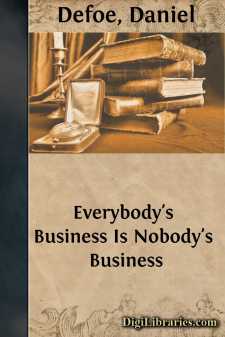Categories
- Antiques & Collectibles 13
- Architecture 36
- Art 48
- Bibles 22
- Biography & Autobiography 813
- Body, Mind & Spirit 142
- Business & Economics 28
- Children's Books 15
- Children's Fiction 12
- Computers 4
- Cooking 94
- Crafts & Hobbies 4
- Drama 346
- Education 46
- Family & Relationships 57
- Fiction 11828
- Games 19
- Gardening 17
- Health & Fitness 34
- History 1377
- House & Home 1
- Humor 147
- Juvenile Fiction 1873
- Juvenile Nonfiction 202
- Language Arts & Disciplines 88
- Law 16
- Literary Collections 686
- Literary Criticism 179
- Mathematics 13
- Medical 41
- Music 40
- Nature 179
- Non-Classifiable 1768
- Performing Arts 7
- Periodicals 1453
- Philosophy 64
- Photography 2
- Poetry 896
- Political Science 203
- Psychology 42
- Reference 154
- Religion 513
- Science 126
- Self-Help 84
- Social Science 81
- Sports & Recreation 34
- Study Aids 3
- Technology & Engineering 59
- Transportation 23
- Travel 463
- True Crime 29
The Essays of Montaigne - Volume 12
by: Charles Cotton
Categories:
Description:
Excerpt
Well, but some one will say to me, this design of making a man's self the subject of his writing, were indeed excusable in rare and famous men, who by their reputation had given others a curiosity to be fully informed of them. It is most true, I confess and know very well, that a mechanic will scarce lift his eyes from his work to look at an ordinary man, whereas a man will forsake his business and his shop to stare at an eminent person when he comes into a town. It misbecomes any other to give his own character, but him who has qualities worthy of imitation, and whose life and opinions may serve for example: Caesar and Xenophon had a just and solid foundation whereon to found their narrations, the greatness of their own performances; and were to be wished that we had the journals of Alexander the Great, the commentaries that Augustus, Cato, Sylla, Brutus, and others left of their actions; of such persons men love and contemplate the very statues even in copper and marble. This remonstrance is very true; but it very little concerns me:
"Non recito cuiquam, nisi amicis, idque coactus;
Non ubivis, coramve quibuslibet, in medio qui
Scripta foro recitant, sunt multi, quique lavantes."
["I repeat my poems only to my friends, and when bound to do so;
not before every one and everywhere; there are plenty of reciters
in the open market-place and at the baths."—Horace, sat. i. 4, 73.]
I do not here form a statue to erect in the great square of a city, in a church, or any public place:
"Non equidem hoc studeo, bullatis ut mihi nugis,
Pagina turgescat……
Secreti loquimur:"
["I study not to make my pages swell with empty trifles;
you and I are talking in private."—Persius, Sat., v. 19.]
'tis for some corner of a library, or to entertain a neighbour, a kinsman, a friend, who has a mind to renew his acquaintance and familiarity with me in this image of myself. Others have been encouraged to speak of themselves, because they found the subject worthy and rich; I, on the contrary, am the bolder, by reason the subject is so poor and sterile that I cannot be suspected of ostentation. I judge freely of the actions of others; I give little of my own to judge of, because they are nothing: I do not find so much good in myself, that I cannot tell it without blushing.
What contentment would it not be to me to hear any one thus relate to me the manners, faces, countenances, the ordinary words and fortunes of my ancestors? how attentively should I listen to it! In earnest, it would be evil nature to despise so much as the pictures of our friends and predecessors, the fashion of their clothes and arms. I preserve their writing, seal, and a particular sword they wore, and have not thrown the long staves my father used to carry in his hand, out of my closet.
"Paterna vestis, et annulus, tanto charior est posteris, quanto erga parentes major affectus."
["A father's garment and ring is by so much dearer to his posterity, as there is the greater affection towards parents." —St. Aug., De Civat. Dei, i. 13.]
If my posterity, nevertheless, shall be of another mind, I shall be avenged on them; for they cannot care less for me than I shall then do for them. All the traffic that I have in this with the public is, that I borrow their utensils of writing, which are more easy and most at hand; and in recompense shall, peradventure, keep a pound of butter in the market from melting in the sun:—[Montaigne semi-seriously speculates on the possibility of his MS. being used to wrap up butter.]
"Ne toga cordyllis, ne penula desit olivis;
Et laxas scombris saepe dabo tunicas;"
["Let not wrappers be wanting to tunny-fish, nor olives;
and I shall supply loose coverings to mackerel."
—Martial, xiii. I, I.]
And though nobody should read me, have I wasted time in entertaining myself so many idle hours in so pleasing and useful thoughts?...






















